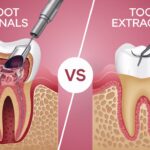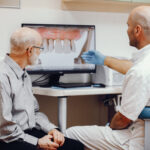Tooth Decay Symptoms & Treatments
Tooth decay is one of the most common problems associated with dental health. Most people need to find a dentist at some point to deal with cavities, gum disease, and other issues that occur because of tooth decay. If you have tooth decay, it’s ideal to treat it as soon as possible before it gets worse. If you leave tooth decay untreated, it may eventually necessitate emergency dental care or tooth extraction. In this article, we discuss tooth decay symptoms and tooth decay treatment, and how to find a dental professional at a walk-in dentist near me.What Is Tooth Decay, And Why Is It A Problem?
Tooth decay generally refers to the wearing off of your tooth enamel, which is the hard outer layer of your teeth. Tooth decay can occur to anyone, children, adults, and teenagers. Tooth decay generally occurs due to the accumulation of plaque, tartar, and bacterial decay. Tooth decay is always chronic, which is why you need to seek tooth decay treatment immediately. The following are the Tooth Decay Symptoms:- You may suffer from immense toothache. It will either be continuous and keep you up at night or you may feel occasional sharp stabbing pains.
- Your teeth will feel tender and sensitive while eating or drinking cold or hot food and drinks.
- Cavities will develop in your teeth.
- You’ll see gray, brown, or black spots or holes in your teeth.
- Persistent bad breath that won’t go away even if you brush and floss regularly.
- There will be an unpleasant and persistent taste in your mouth.
- Over time, tooth decay may also get so bad that you’ll need a root canal.
What Causes Tooth Decay?
No matter how well you brush and floss your teeth, you can never get rid of all the food particles stuck in the deep recesses of your teeth and gums. Over time, the accumulation of food particles leads to the formation of plaque and tartar, which invites bacterial decay. Bacteria feast on the plaque and tartar and release acids that gradually affect the dental surface and enamel. This dental decay initially only affects the enamel, but it may also spread to the gum tissues, dentin, and the pulp chamber. This leads to complications like gum disease and you may need a root canal to remove all the infected pulp and protect your teeth from complete decay. Furthermore, you may also suffer from a dental abscess, which is the collection of pus at the end of the teeth or within the gum tissues. This can be extremely painful and dangerous.How To Treat Tooth Decay?
If you can identify any of the tooth decay symptoms, you must find a dentist in your location immediately. Tooth decay is easier to treat earlier to detect and seek tooth decay treatment. During your consultation, the dentist will identify the Tooth Decay Symptoms and examine them using x-rays. Following that, they’ll proceed to the following treatments:- If you identify tooth decay at an early stage, the dentist will simply discuss your oral hygiene habits and the amount of sugar you eat. The dentist may apply a fluoride gel to your teeth to protect the enamel from bacterial decay.
- The dentist will also remove all of the accumulated plaque from your teeth and gums using a scaler. Following that, if you have gum disease as well, they may use the root planning procedure to smoothen the surface of your root and reattach it to your teeth.
- If you have cavities, the dentist will apply a dental filling to cover them up. They’ll remove the dental decay and infection first before proceeding with the filling.
- If the infection has spread into the pulp chamber, the dentist will need to go through with a root canal procedure. During this procedure, the dentist will remove the infected pulp and clean out the insides of your teeth. Following that, they may recommend a dental crown.
- As a last resort, if the infection has spread to the root and the tooth is completely damaged, the dentist may recommend a tooth extraction. Once the tooth is removed, they may recommend restorative options like dental crowns, dental bridges, or implants.
What Is The Most Common Problem In Teeth?
Besides the common cold, tooth decay or cavities are the most prevalent disease in the United States. During tooth decay, the plaque and tartar on your teeth lead to bacterial decay, which leads to the wearing off of the surface of your teeth.Why Do You Need An Emergency Dentist’s Tooth Extraction?
It’s not always possible to protect your teeth from complete decay. If you ignore the tooth decay symptoms for a while and don’t seek tooth decay treatment soon, you may eventually need an emergency dentist’s tooth extraction. This happens when the bacterial infection spreads to the root of your tooth and there’s a risk of the infection spreading to the other teeth and your bone structure as well. In that case, the dentist has no other option but to remove your infected tooth altogether. Other possible causes of emergency dentist tooth extraction include impacted wisdom teeth, fractured teeth, periodontal disease, and crowded teeth.What does the emergency dentist’s tooth extraction cost?
The cost of an average non-surgical tooth extraction ranges from $75 to $300. However, the cost of emergency tooth extraction (often surgical) may range from $185 to $600.Find an Emergency Dentist Today
URBN Dental is one of the best dental clinics for emergency tooth extraction and fillings in Houston, TX. We have some of the best emergency dentists who can examine your teeth and make sure you maintain optimal oral health. For more information, please find an emergency dentist today.Summary:
Tooth decay is one of the most common problems associated with dental health. Most people need to find a dentist at some point to deal with cavities, gum disease, and other issues that occur because of tooth decay. If you have tooth decay, it’s ideal to treat it as soon as possible before it gets worse. If you leave tooth decay untreated, it may eventually necessitate emergency dental care or tooth extraction. Tooth decay generally refers to the wearing off of your tooth enamel, which is the hard outer layer of your teeth. Over time, the accumulation of food particles leads to the formation of plaque and tartar, which invites bacterial decay. Bacteria feast on the plaque and tartar and release acids that gradually affect the dental surface and enamel. This dental decay initially only affects the enamel, but it may also spread to the gum tissues, dentin, and the pulp chamber. URBN Dental is one of the best dental clinics for emergency tooth extraction and fillings in Houston, TX. We have some of the best emergency dentists who can examine your teeth and make sure you maintain optimal oral health. For more information, please find an emergency dentist today.URBN Dental Services in Houston, TX
Houston | Katy | Montrose | West University Place | Greater Third Ward | Greater East End | North East Houston | Houston Heights | Central Northwest | Fairbanks | Acres Home | East Houston | Southeast Houston | Central Southwest | Fort Bend Houston | Brays Oaks | Meyerland Area | Sharpstown | Alief | Westchase | Memorial | Northwest Houston | Katyland | Whispering Lakes | Pine Lakes | Woodcreek Reserve















